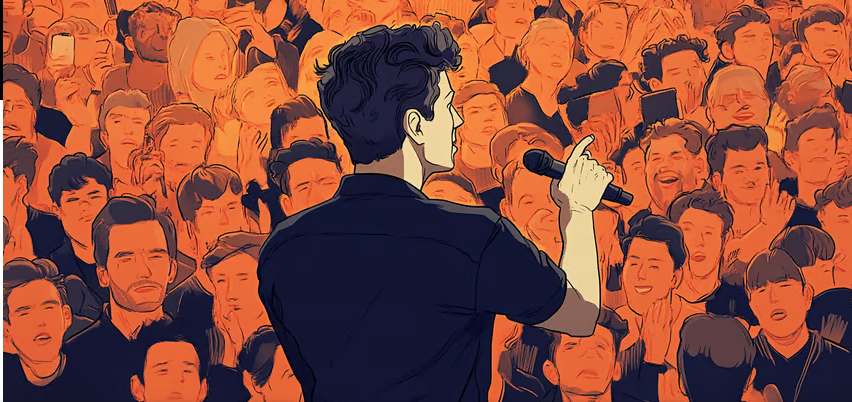Hark, what light from yonder data center breaks? It is the East, and Sam Altman is the sun. Arise, fair sun, and kill the envious moon of gainful human employment, which is already sick and pale with grief that thou, her prophet, art far more fair than she.
In the grand and tragic theatre of Silicon Valley, where kings of code rise and fall with the quarterly earnings report, and where the loftiest soliloquies are delivered not on a stage but in a 280-character tweet, we have entered a new and curious act. The players, once mere merchants of silicon and software, now style themselves as philosophers and saviors. And in this grand production, one player has claimed the leading role, not as a king, nor a general, but as the high priest of a new and dazzling faith. His name is Sam Altman, and his gospel is Artificial General Intelligence.
Yet, to understand this sermon, one must look not to the hallowed halls of MIT, but to the sprawling megachurch of Lakewood in Houston, Texas. For Sam Altman is the Joel Osteen of tech: a purveyor of hope so potent, so beautifully packaged, and so divorced from the messy realities of the world that it has become its own celestial product. Both men, blessed with a disarming smile and immaculate hair, preach a gospel of inevitable triumph. Osteen promises salvation in the next life; Altman promises it in the next ChatGPT iteration. Their cathedrals differ—one of steel and soaring glass, the other of servers and undersea cables—but the core sermon is identical: have faith, believe in the vision, and a better world is not just possible, but guaranteed. Your best life is now, or at least, in the next funding round.
A Sermon for the Anxious Masses
Attend a sermon by Joel Osteen, and you will not be burdened with the grim toil of theological debate or the thorny brambles of scripture. You will be bathed in a warm light of affirmation. You are a victor. You are a champion. Heaven’s plan for you is one of prosperity. It is simple, it is uplifting, and it asks of you only one thing: belief.
Now, observe Sam Altman before the Senate, or in a hushed conversation on a tech podcast that will soon garner millions of views. He does not speak of algorithms, but of “benefit to all humanity.” He does not dwell on the soul-crushing drudgery of data annotation, but on the “flowering of human creativity.” The coming AGI, he proclaims with the quiet certainty of a man who has seen the promised land, will be our “tool,” our “partner,” our “amplifier.” It will cure disease, it will solve climate change, it will compose symphonies. His words, like Osteen’s, are a masterclass in professional vagueness, crafted to soothe and inspire, never to challenge or specify.
The gospel of OpenAI is a prosperity gospel for the digital age. It tells the anxious knowledge worker, “Fear not, for your job will not be taken, but ‘transformed.’” It tells the terrified artist, “Fear not, for your creativity will not be devalued, but ‘unlocked.’” It tells a society fractured by misinformation, “Fear not, for the machine that can create infinite falsehoods will also, somehow, become our greatest source of truth.” It asks of us no hard choices, no uncomfortable trade-offs. It asks only for our faith, our data, and a monthly subscription fee.
The Collection Plate, Reimagined for the Apocalypse
Every great church needs a sacrament, a physical act to bind the faithful to the divine. For the church of AGI, this sacrament is the Orb. The venture known as Worldcoin is perhaps the most brazenly Shakespearean subplot in this entire drama—a tragedy of privacy, cloaked in the comedic robes of a sci-fi blockbuster.
The proposition is thus: render unto Sam the image of thine own iris, the very window to thy soul. In exchange for this biometric offering, you shall receive a pittance of digital currency, a token of your unique “proof of humanity.” It is a stroke of genius so cynical it borders on poetry. To solve the problem of a digital world polluted by AI-generated bots—a problem his own company is furiously accelerating—the solution is to have every man, woman, and child on Earth sacrifice their most unique identifier to his corporate ledger. It is the theological equivalent of a factory owner selling bottled water to the village whose river he has just polluted.
This is Osteen’s collection plate, scaled for the global apocalypse. It is a system that presents itself as a gift to the masses, a path to inclusion in the coming digital utopia, while the true value flows in only one direction. The faithful receive their handful of tokens, feeling for a moment like they are part of the future. The church, meanwhile, builds the most comprehensive database of human identity ever conceived, the foundational infrastructure for a new world order it alone will control.
The King Lear of Palo Alto
And what of the drama, the inevitable betrayal? The brief, chaotic ouster of Altman from his throne in the winter of 2023 was not a corporate restructuring; it was a palace coup, a scene straight from Richard III. The board, in their role as the scheming dukes, spoke of a sacred mission and the CEO’s lack of “candor,” a charge so deliciously vague it could mean anything from stealing office supplies to prematurely birthing a sentient god in a server farm.
For five days, the kingdom was in turmoil. The court was in chaos. The specter of a rival king, Microsoft’s Satya Nadella, loomed large, offering sanctuary and a new throne to the exiled prophet. But then, the triumphant return. Borne aloft on a wave of employee petitions and investor pressure, Altman was restored, his power not diminished, but consecrated.
The coup revealed the core truth of the Church of AGI, just as a scandal reveals the core truth of any megachurch. The stated mission—“to ensure that artificial general intelligence benefits all of humanity”—was but a noble tapestry hung to conceal a far simpler reality. The true mission was to protect the prophet. The business, it turned out, was not salvation; the business was Sam. When the choice came between the sacred charter and the charismatic leader, the charter was burned to keep the leader warm. The church had shown that it would rather abandon its god than fire its priest.
And so, the curtain falls on this act, and we, the audience, are left to ponder our part in this play. We are offered a beautiful, frictionless future, a heaven on Earth powered by AI of loving grace. The price of admission is merely to stop asking difficult questions, to stop wrestling with the messy, inefficient, and beautifully flawed business of being human. We are promised absolution from the struggle.
But the question remains, a whisper in the wings of the theatre: what is a man, if the thoughts he thinks and the art he creates are but an echo of a machine’s prompt? What becomes of the soul when it is outsourced? The sermon of Sam Altman is intoxicating, his vision of the future a masterpiece of light and hope. But as with all faiths built on the promise of effortless salvation, one must eventually ask if the god in the machine is truly divine, or if it is merely a reflection of the man who built the stage.
What are your thoughts on the new high priests of technology? Do their sermons bring you hope, or a sudden urge to check the terms and conditions of your soul? Let us know in the comments below.
Ready for the Full Revelation?
If you suspect the road to utopia is paved with suspiciously good press releases, or if you’ve ever felt that “disruptive innovation” is just a fancy term for “firing your dad,” then you’re ready for the full scripture.
My new book, “The Subtle Art of Not Giving a Prompt,” is the survival guide for a world led by smiling prophets with impeccable branding. It’s a deep dive into the beautiful, terrifying, and utterly absurd reality of the AI age. Find it on Amazon, before an AI reads it and summarizes it so perfectly you’ll be robbed of the struggle.
And if this article has granted you a moment of pure, unadulterated clarity—or plunged you into a deep existential dread—consider it a tithe. You can donate to TechOnion.org and help us continue our sacred mission of questioning the people who are building our future in their own image.






GIPHY App Key not set. Please check settings